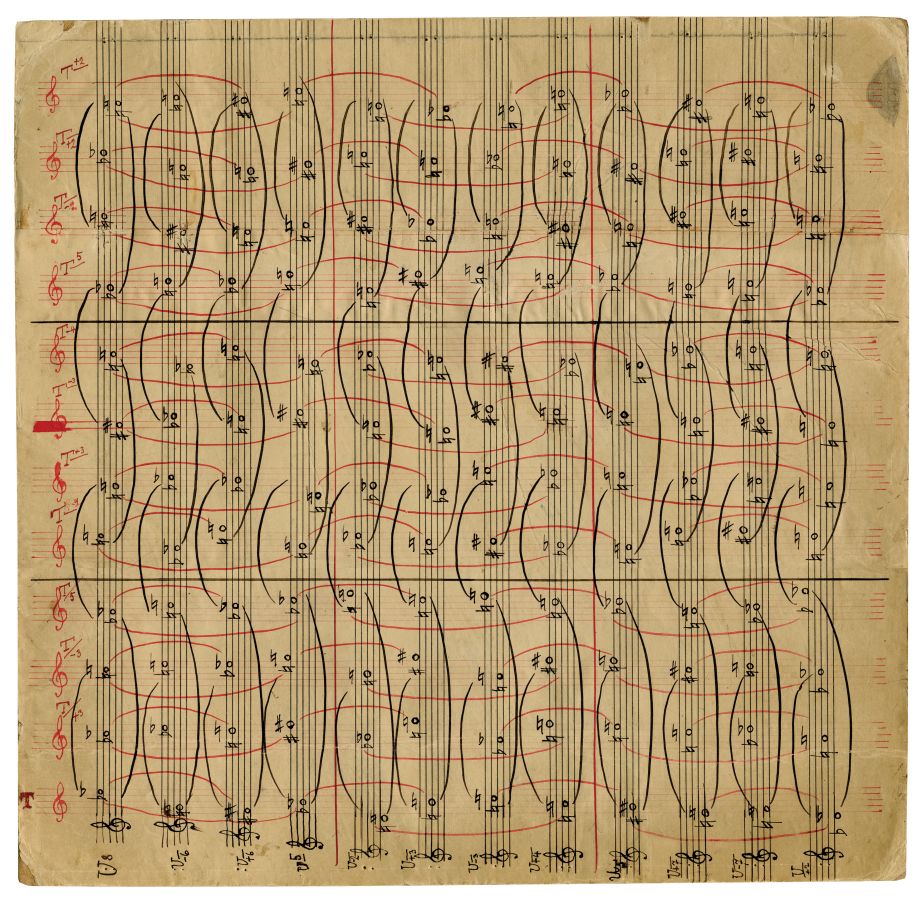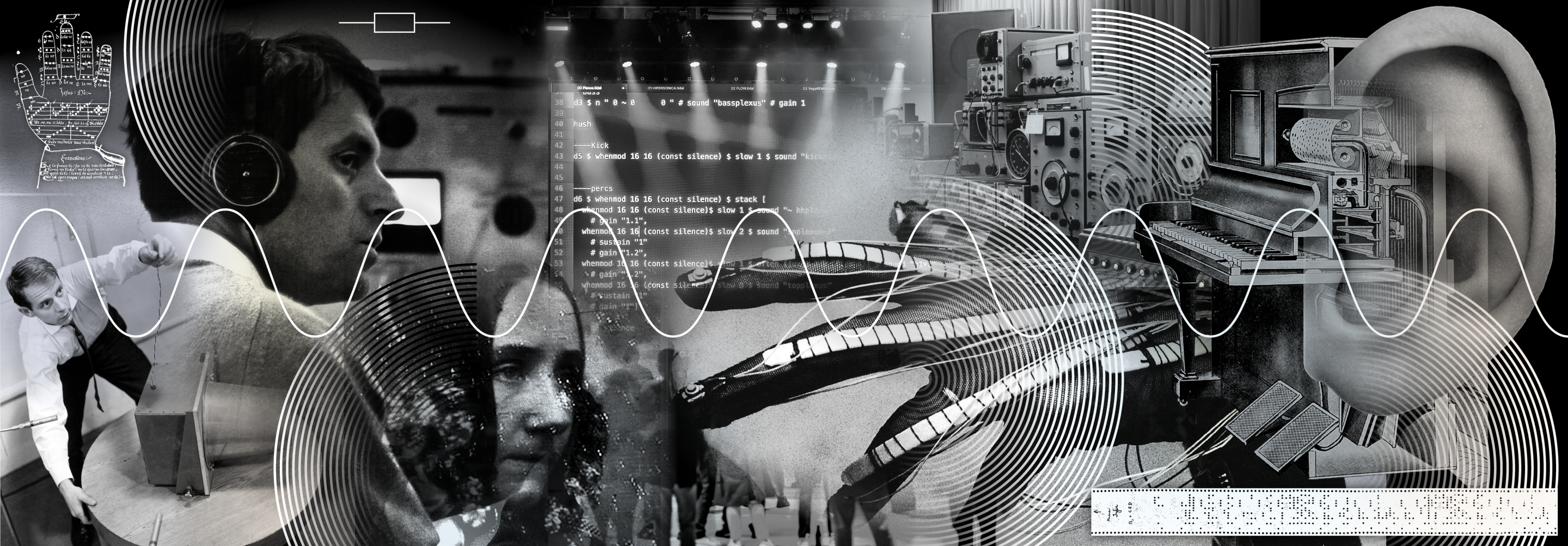From Tuesday to Sunday
11 am – 6 pm
Free Entry
Place Cosandey
1015 Lausanne
Free guided tour on the first Saturday of the month at 11:15 am. No registration required.
From Medieval theory to modern AI, Musica ex Machina: Machines Thinking Musically explores the history of computational and algorithmic thought in music, showcasing how technological advances and human creativity have continuously expanded the boundaries of musical expression. Through historical objects, musical artworks, and immersive installations, the exhibition presents the works of past and present visionaries while looking ahead to the future of music.

Exhibition view
Photo: Julien Gremaud

Exhibition view
Photo: Julien Gremaud

Exhibition view
Photo: Julien Gremaud

Exhibition view
Photo: Julien Gremaud

Exhibition view
Photo: Julien Gremaud

Exhibition view
Photo: Julien Gremaud

Exhibition view
Photo: Julien Gremaud

Exhibition view
Photo: Julien Gremaud

Exhibition view
Photo: Julien Gremaud

Exhibition view
Photo: Julien Gremaud
The exhibition traces the evolution of music as it intertwines with technological progress, showing how scientific and technological breakthroughs from each era have shaped musical composition and performance.
From analogue, hand-calculated, systems to mechanical machines, modern computers, and now artificial intelligence, it examines the profound impact of computational thinking on music and the pivotal role of algorithms in its development.
Celebrating human fascination with symbols, systematic thinking, and new sounds, Musica ex Machina presents the works of pioneers and their successors who foster the interweaving of machines, algebraic thinking, and technological innovation to push the boundaries of music.
Through a unique blend of historical artifacts, ancient and contemporary artworks, and immersive sound experiences, the exhibition offers a comprehensive historical narrative on the profound impact of technological tools on musical creativity.
Unfolding centuries of rich history, Musica ex Machina not only honors the achievements of the past but also anticipates the future, envisioning how ongoing advancements in technology will continue to transform the landscape of music.

Laetitia Sonami with the lady’s glove v.4.
Image courtesy of Laetitia Sonami. Photo credit: © F. Hoekzema.

16th century copy of the Guidonian Hand
Photo: © Bodleian Libraries, University of Oxford

The Buchla 200e Skylab synthesiser.
Courtesy of SMEM. Photo: ©Victorien Genna.

Heart-shaped score of Belle, Bonne, Sage by Baude Cordier.
Courtesy of Château de Chantilly, musée Condé, manuscrit 564, f. 11v. Cliché IRHT-CNRS / Bibliothèque du château de Chantilly.

CSIRAC computer.
Image courtesy of CSIRO Archive

The automaton The Musician.
© Musée d'art et d'histoire de Neuchâtel. Photo: Stefano Iori.

Sketch of the Diatope, by Iannis Xenakis.
Image courtesy of the Xenakis Family.

The Tonal Cloud in the shape of a torus.
© DCML

Illustration of an automated organ with humanoid automata. In Musurgia Universalis by A. Kircher.
Sp Coll Ferguson Af-x.10, by permission of University of Glasgow Archives and Special Collections.

UPIC.
Courtesy of CMRC/KSYME, Athens. © Estela Valasi

15th century slate with musical notes.
Image courtesy of City of Ghent, Urban Archaeology and Heritage Conservation Service.

George Lewis with an Apple II & an algorithmically-driven kalimba instrument.
Image courtesy of George Lewis.

Suite op. 29, Bidirectional twelve‐tone row chart, MS29.
©Arnold Schönberg Center, Wien

Life Codes by A. Cardenas.
Photo: © Katya Goliath.

Senior Gramophone Expert.
Private collection.

12th century Persian automaton.
Image courtesy of the National Museum of Asian Art, Smithsonian Institution, Freer Collection, Purchase - Charles Lang Freer Endowment, F1930.73.
Roberto Alonso Trillo · Guido d'Arezzo · Charles Babbage · Clarence Barlow · John Cage · Alexandra Cárdenas · Pedro Cerone · John Coltrane · Baude Cordier · Nikolay Diletsky · Paul Doornbusch · Leonhard Euler · Josef Matthias Hauer · Ivo Haun · Geoff Hill · Otakar Hostinský · Jonathan Impett · Henri-Louis Jaquet-Droz · Athanasius Kircher · George Lewis · György Ligeti · Ada Lovelace · Stephen Malinowski · Wolfgang Amadeus Mozart · Johannes de Muris · Nicolas Namoradze · Conlon Nancarrow · Luigi Nono · Marek Poliks · Josquin des Prez · Martin Rohrmeier · Arnold Schönberg · Laetitia Sonami · Karlheinz Stockhausen · Jennifer Walshe · Michel Waisvisz · Richard Widdess · Michael Wollny · Iannis Xenakis
